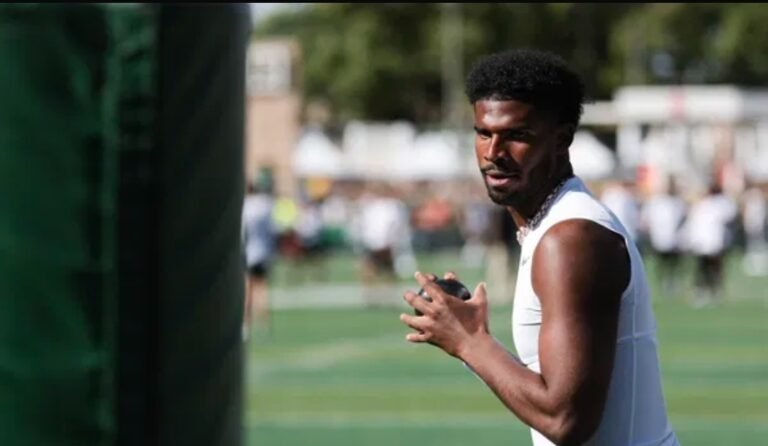Josh Jacobs, the star running back for the Green Bay Packers, recently broke his silence on a topic that has sent ripples through the college football and NFL worlds: Shedeur Sanders’ future in the NFL. His words came amid mounting concerns about Sanders’ draft stock following a pivotal point in his college career that some believe might jeopardize his prospects for a top spot in the upcoming draft.
Shedeur Sanders, son of famed NFL Hall of Famer Deion Sanders, has long been heralded as one of the brightest young quarterbacks in college football. A dynamic playmaker for the Colorado Buffaloes, Sanders’ talent is undeniable. His arm strength, poise in the pocket, and leadership qualities have earned him comparisons to some of the NFL’s elite quarterbacks. However, with the NFL Draft fast approaching, questions about his long-term future have emerged.
Jacobs, who has spent years navigating the ever-changing and often unforgiving NFL landscape, weighed in with a mix of caution and optimism. “Shedeur has all the talent in the world, but I think the biggest hurdle for him might be his ability to adjust to the speed of the NFL,” Jacobs said. He went on to explain that Sanders’ performance in high-pressure situations, particularly in big games, would be under intense scrutiny. While he praised Sanders’ leadership and work ethic, Jacobs warned that some of Sanders’ recent performances raised red flags.
The controversy surrounding Sanders began after Colorado’s disappointing bowl game loss, where Sanders failed to deliver a consistent performance. Critics quickly pounced on his decision-making, citing his struggles under pressure and an inability to make the key throws when it mattered most. These concerns were amplified by his tendency to force passes into tight windows and his inconsistent footwork. Many analysts questioned whether his success in college football would translate to the NFL’s much faster and more punishing environment.
What made Jacobs’ commentary even more striking was his mention of an alleged concern among NFL scouts about Sanders’ adaptability. “They’re looking at how he handles adversity,” Jacobs continued. “It’s not just about talent, it’s about the mental game—the NFL is built on that. If you can’t handle pressure in college, the NFL is going to eat you alive.” Jacobs acknowledged that Sanders has shown resilience, but the question remains whether his mental fortitude is strong enough to survive the relentless nature of the NFL.
This bold assessment stirred up controversy among football fans and pundits. Many rallied behind Sanders, defending his potential. “He’s the next big thing. People forget how young he is. This is just growing pains,” one analyst tweeted. Yet, others echoed Jacobs’ concerns, expressing doubts about Sanders’ ability to thrive under the immense pressure of professional football.
Furthermore, some speculated about the influence of Deion Sanders, Shedeur’s father, whose meteoric rise as Colorado’s head coach has been accompanied by a flood of media attention. Was Shedeur’s spotlight too bright too soon? Did the scrutiny surrounding his father’s success put more pressure on him than any rookie should face? The discussion became even more complicated as Deion’s coaching style came under fire, with critics questioning whether it’s truly preparing Shedeur for the cutthroat nature of the NFL or if it’s fostering bad habits.
In the midst of all the debate, Jacobs remained steadfast in his belief that Sanders has the tools to succeed but may need to refine his game, especially in handling pressure situations. “He’s got the potential, but it’s about development,” Jacobs concluded.
As the NFL Draft looms closer, Shedeur Sanders’ fate remains in the balance. Will his father’s legacy help or hinder his path? Can he overcome his critics and prove that his college performances were just a glimpse of what’s to come? Only time will tell, but one thing is certain: this controversy will only fuel the growing anticipation surrounding his future in the league.
